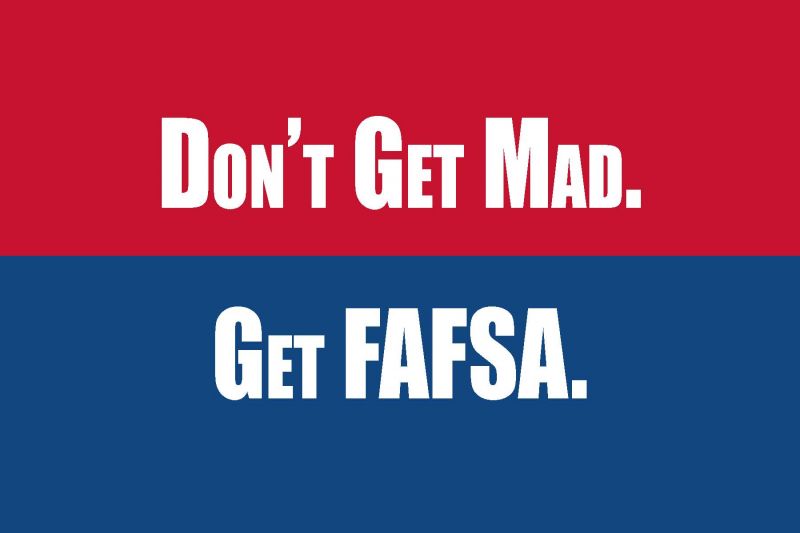Share this Story
New FAFSA Deadlines A Win for Students and Families
Ability to file and use earlier tax information will allow more financial planning time
 New rules that recently went into place for the Free Application for Federal Student Aid (FAFSA) should makes the financial aid process smoother for current and prospective Virginia Wesleyan students and all students and their families across the country. As of this year, the FAFSA can be filed as early as October 1 (rather than January 1) and will reflect earlier incoming information than in the past (see details below).
New rules that recently went into place for the Free Application for Federal Student Aid (FAFSA) should makes the financial aid process smoother for current and prospective Virginia Wesleyan students and all students and their families across the country. As of this year, the FAFSA can be filed as early as October 1 (rather than January 1) and will reflect earlier incoming information than in the past (see details below).
“This is good news for students and their parents,” says Virginia Wesleyan Financial Aid Director Teresa Rhyne. “By moving the process up and allowing the use of the previous year’s tax information, families are better able to plan and make timely decisions about their financial needs for college.”
The information below outlines the specific changes and Frequently Asked Questions for 2017-18 and can be found on the U.S. Department of Education website: https://studentaid.ed.gov/sa/about/announcements/fafsa-changes
Starting with the 2017–18 Free Application for Federal Student Aid (FAFSA®), the following changes have been put in place:
- Students are now able to submit a FAFSA® earlier. Students have been able to file a 2017–18 FAFSA since Oct. 1, 2016, rather than beginning on Jan. 1, 2017. The earlier submission date is a permanent change, enabling students to complete and submit a FAFSA as early as Oct. 1 every year. (There is NO CHANGE to the 2016–17 schedule. The FAFSA became available Jan. 1 as in previous years.)
- Students now report earlier income information. Beginning with the 2017–18 FAFSA, students are required to report income information from an earlier tax year. For example, on the 2017–18 FAFSA, students (and parents, as appropriate) must report their 2015 income information, rather than their 2016 income information.
Frequently Asked Questions About the 2017-18 FAFSA®
Are deadlines now earlier?
The federal deadline isn't earlier, but some state and school deadlines are. Most state and school deadlines haven’t changed, but be aware of this: Several states’ deadlines have changed from “as soon as possible after Jan. 1” to “as soon as possible after Oct. 1.” Find state deadlines on the FAFSA and school deadlines on schools’ websites.
Do I have to apply for admission to a school before I list it on my FAFSA?
No. On your FAFSA, list all the schools to which you have applied or might apply.
Will my 2016–17 FAFSA information be carried over onto the 2017–18 FAFSA?
If you choose the Renewal FAFSA option when you start your application at fafsa.gov, some basic information from your 2016–17 FAFSA will be prepopulated in your 2017–18 FAFSA. However, your tax and income information will not. (Too much could have changed in your life since you filled out the 2016–17 FAFSA.)
Can I choose to report 2016 information if my family’s income has dropped significantly since we filed 2015 taxes?
No. You must report 2015 tax and income information, as the FAFSA requires. If your family’s financial situation has changed dramatically since then, you should complete the FAFSA questions as required, submit the FAFSA, then contact the school you plan to attend and discuss your situation with the financial aid office.
Do I report my 2015 tax and income information on the 2017–18 FAFSA now, and then update it once I’ve filed my 2016 taxes?
No. Do not update after filing your taxes. The 2017–18 FAFSA asks for 2015 tax information.
What if my parents’ (or my) marital status has changed since we filed 2015 taxes? How do we supply tax and income information on the FAFSA?
Here are some tips for this type of situation:
- The FAFSA asks for marital status “as of today” (the day it’s filled out). So if the student or parent is married now but wasn’t in 2015 (and therefore didn’t file taxes as married), the spouse’s income will need to be added to the FAFSA.
- Similarly, if the student or parent filed 2015 taxes as married but is no longer married when filling out the FAFSA, the spouse’s income will need to be subtracted.
- And if the student or parent was married when filing 2015 taxes, then got divorced and is now married to someone else, there’s a bit more math to do: Subtract the ex’s income, then add the new spouse’s income.
- The help text in fafsa.gov will discuss all these situations.
Will I receive aid offers from schools earlier if I apply earlier?
Not necessarily; some schools will make offers earlier, and others won’t. And keep in mind that an early offer might be an estimated offer, so read communications from schools carefully.
If you have questions about the FAFSA or other financial aid processes, call the Virginia Wesleyan College Financial Aid Office:
Financial Aid Office
Godwin Hall
1584 Wesleyan Dr.
Norfolk, VA 23502
757.455.3345
finaid@vwu.edu
School Code: 003767

